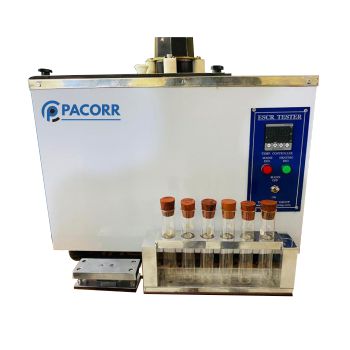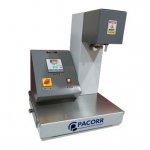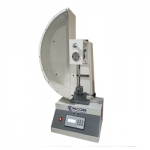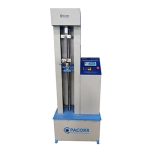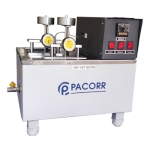Environmental stress cracking resistance tester (ESCR) is an ideal testing instrument that can be used for testing the impact of environmental factors on plastic products and materials. When we are talking about the industrial usage of different materials, it must be kept in mind that there are many factors that can make the environment of the industries very harsh and difficult to work with.


| Feature | Description |
|---|---|
| Purpose | Testing the impact of environmental factors on polymers |
| Industry Relevance | Essential for industries that use materials prone to environmental stress cracking, such as plastics, rubber, and polymers |
| Testing Capability | Capable of simulating harsh industrial environments to assess material lifespan |
| Key Components | Includes a cabinet with the ability to simulate humidity, moisture, and chemical exposure |
| Specifications | Advanced digital PID temperature controller, microprocessor-based, supports up to six tests simultaneously |
| Suitable Materials | Primarily focused on plastics, rubber, and polymers |
| Quality Assurance | Helps in ensuring that materials can withstand environmental stresses without failure |
The Environmental Stress Cracking Resistance Tester (ESCR) represents a critical technological advancement for industries reliant on materials that must endure harsh environmental conditions. This testing apparatus is designed to simulate the real-world conditions materials like plastics, rubber, and polymers might face in industrial settings. It's a key tool for assessing how these materials react when exposed to elements such as humidity, moisture, and chemical fumes, which are prevalent in various industrial environments.
Understanding Environmental Stress Cracking Resistance
Environmental Stress Cracking (ESC) is a common cause of failure in thermoplastic parts, accounting for approximately 15-30% of all such failures. ESC occurs when plastic parts crack under stress levels below their short-term mechanical strength, often in the presence of chemicals or other active agents. This phenomenon highlights the necessity of ESC testing to ensure the longevity and reliability of plastic products across numerous applications.
Significance of ESCR Testing
The primary goal of ESCR testing is to evaluate a material's durability and resistance to cracking under environmental stresses, thereby ensuring product reliability and safety. By identifying potential weaknesses in the material's structure, manufacturers can make necessary adjustments to improve product quality and extend its lifespan. This process is essential for industries where materials are continuously exposed to potentially corrosive or damaging environmental conditions.
Features of the ESCR Tester
The ESCR tester provided by Pacorr offers a comprehensive solution for assessing the impact of environmental factors on materials. Key features include a microprocessor-based digital auto-tuning PID controller for precise temperature management, rapid heaters for uniform heating, and a stirrer motor for consistent sample agitation. The tester is equipped to conduct six tests simultaneously, offering efficiency and versatility in evaluating different materials or conditions in parallel.
Industries Benefiting from ESCR Testing
Industries that manufacture products exposed to corrosive environments, such as paints, coatings, metals, and rubber, stand to benefit significantly from ESCR testing. By ensuring that their products can withstand environmental stresses, these industries can guarantee better quality and durability, enhancing customer satisfaction and trust.
The Environmental Stress Cracking Resistance Tester is an indispensable tool for industries reliant on materials susceptible to environmental stress cracking. By providing a means to simulate and assess the impact of various environmental factors, the ESCR tester plays a crucial role in quality assurance, product development, and reliability testing. As materials and environmental conditions evolve, the importance of such testing apparatus will only increase, underscoring the need for continuous innovation and adaptation in material science and engineering.
The most commonly tested materials for environment stress cracking resistance include plastics, rubber, polymers and so forth. The environmental stress cracking resistance tester manufacturers and suppliers offer a cabinet which is capable of simulating the actual environmental conditions in an industry and can assess the life cycle of a material when it is subjected to such conditions. With the help of this testing apparatus, the manufacturers can easily ensure that the products they are going to use is fit for their environment and can give a long service life without any failure.
The ESCR manufacturers and suppliers provide a machine that simulates the conditions that are faced by the materials in different industries such as the moisture, humidity, chemical fumes, acidity and physical tension. It is an ideal equipment that can be used for testing the impact of agents such as soaps, detergents, wetting agents, oils and so forth. The test specimen is placed in the cabinet for a specific amount of time under tension and is monitors for any cracking due to stress. After the test duration, the specimen is taken out and the impacts of the test are studied. The instrument is equipped with different glass tubes, holding racks and other accessories make it easy to conduct test accurately and in very less time. The outer body of the apparatus is zinc plated and has a grey finish for better corrosion resistance. This instrument can also help in testing the efficiency of the production process and the treatment given to the products and hence ensures the best quality assurance of the final products.
- Model: PCESCRT-1
- Size: Inner Bath 12” x 14” x 12”
- Material of Construction: Inner Bath S.S. outer M.S.
- Temperature Controller: Microprocessor Based digital Auto tunnel PID controller with range up to 200ËšC Resolution of 0.1ËšC & accuracy of ± 0.5ËšC
- Heating Load: As per required of Bath
- Circulation: Induction motor with stirrer.
- Testing Capacity: Six tests at a time.
- Accessories: Cutting Die, Nicking Jig, bending cum Transfer tool and Specimen holder, Test tube and rubber cork-6 nos. each.
- Power: 230V AC, 1 Phase, 50 Hz.
- Paint: Powder Coating.
- Solution for test Igepal. (Arrange By Customer)
- Temperature controlled through PID controller
- Advanced Digital Microprocessor based PID based temperature controller
- Provision of Set Value(SV) and Process Value(PV) on temperature display
- Inbuilt Auto tuning function
- Equipped with rapid heaters for uniform and homogenous heating and maintaining temperature inside the chamber
- Integral water drain system
- Inbuilt Calibration features with reference to master PID controller
- Stirrer motor for precise stirring of sample inside the tank and uniformity of temperature
- A set of Test tubes along with fixture to hold samples inside the tank
- Standard: ASTM D1693
Environmental Stress Cracking is the phenomenon where cracks develop in plastics due to the combined action of stress and exposure to environmental factors, such as chemicals, without reaching the material's typical failure strength. It is one of the most common failure modes for plastics, particularly under conditions of stress and chemical exposure
The Environmental Stress Cracking Resistance (ESCR) tester simulates the conditions materials are exposed to in real-world environments, including factors like humidity, temperature, and chemical exposure. It subjects the material sample to these conditions while under stress to observe the onset and propagation of cracks, helping manufacturers assess the material's resistance to environmental stress cracking.
Primarily, ESCR testers are used for testing plastics, polymers, and rubber. These materials are commonly subjected to environmental stress cracking tests because of their widespread use in industries where they are exposed to harsh environmental conditions that can lead to failure if the materials are not sufficiently resistant.
ESCR testing is crucial for manufacturers to ensure the durability and reliability of their products, particularly for those used in harsh environments. It helps in identifying potential material failures before the products are marketed, ensuring that they meet the required standards for quality and safety. This testing is especially vital for industries such as automotive, packaging, and construction, where material failure can have significant implications.
While ESCR testing primarily assesses a material's resistance to environmental stress cracking, it provides valuable data that can help predict the potential lifespan of a product under specific conditions. By understanding how a material behaves under environmental stresses, manufacturers can make informed decisions about material selection and product design to enhance durability and performance.
Our Clients
A countless string of happy and satisfied customers vouch for our
excellence and complete quality control support.













